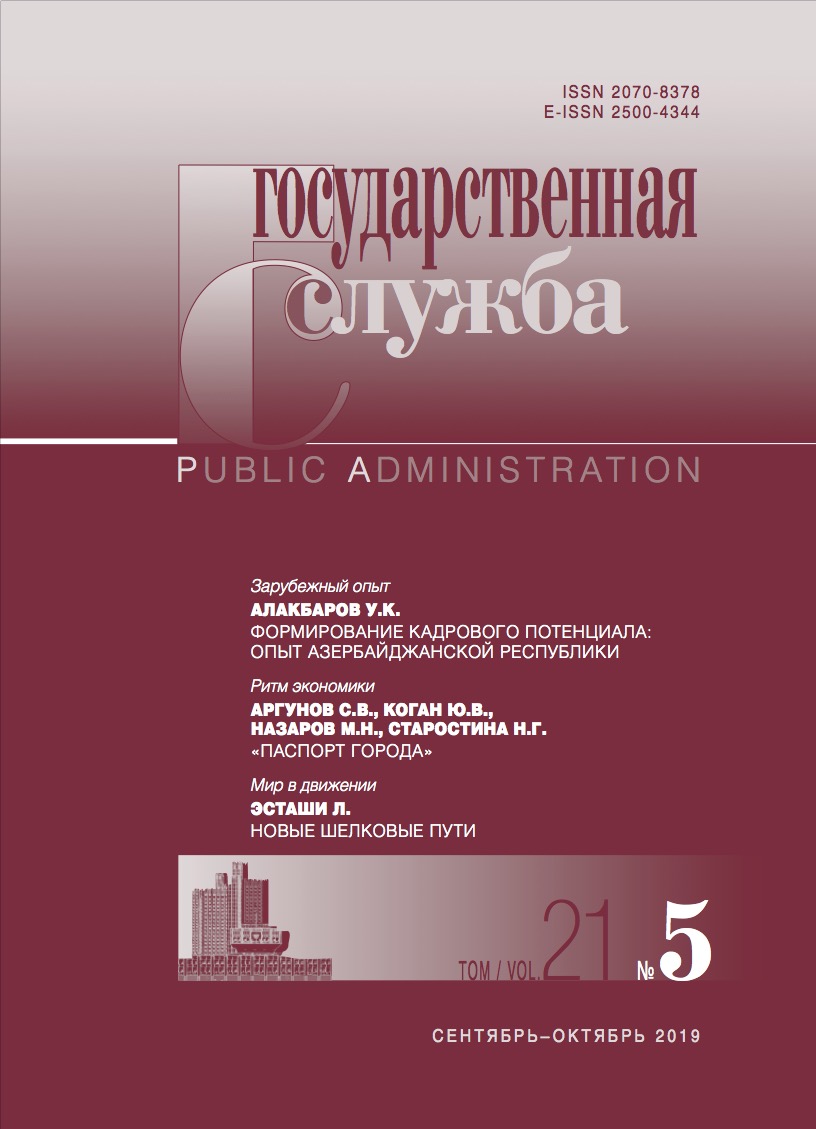Recommended link to article:
URKHAN K. ALAKBAROVа
аAcademy of Public Administration under the President of the Republic of Azerbaijan
DOI: 10.22394/2070-8378-2019-21-5-6-11
Abstract:
The article shows the experience of the Republic of Azerbaijan in the formation of human resources in order to manage sustainable inclusive development. To assess the effectiveness of civil service personnel training, it is proposed to use the analysis of results of their activities. In this paper, indicators of achievements in the field of sustainable inclusive development are used as indicators of the effectiveness of civil servants and their training system. Each state striving to achieve the goals of sustainable inclusive development solves various problems, and the differences are due to the specifics of the country. Examples of such tasks are given for the poorest countries, whose population is daily exposed to poverty and hunger, and for relatively prosperous countries in which humanitarian problems are not so acute and relevant is the task of improving the level of education and health. Obviously, not all of the hundreds of indicators envisaged by the 17 goals of sustainable development are universal in nature and can be used in all countries of the world. Indicators that are equally important for all countries and at the same time meet the global sustainable development goals can serve as a comparative assessment of the performance of civil servants. It is proposed to consider the achievement of significant achievements in economic, social and humanitarian development in a relatively short period of time from a historical point of view as a result of effective activities in the field of training of human resources. Despite the importance of economic potential as a key factor and a necessary condition for sustainable inclusive development, it provides such development only when the country’s leadership is simultaneously pursuing a comprehensively thought out social policy.
Keywords:
sustainable inclusive development, performance indicators, inclusion status, workforce capacity, social policy, civil servants
Received:
October 1, 2019
References:
Alakbarov U.K. Basics of human development and ecological civilization. Baku: Tekhsil, 2013. 224 p. In Russian
Alakbarov U.K. Ecologization of human activity. Energy, Ecology, Economy. 1998. No. 2. P. 141–143. In English
Alakbarov U.K. Innovative technologies of public administration driving world leadership of the Republic of Azerbaijan in sustainable inclusive development. Dövlət İdarəçiliyi: Nəzəriyyə və Təcrübə. 2019. Vol. 65, No. 1. P. 99–108. In English
Alakbarov U.K., Lawrence J.E.S. Energy efficiency as indicator of sustainable development policy: Azerbaijan experience. Journal of Sustainable Development. 2017. Vol. 10. No. 3. P. 187–193. In English
Alakbarov U.K., Lawrence J.E.S. Towards ecological civilization: ideas from Azerbaijan. Journal of Human Resources and Sustainability Studies. 2015. No. 3. P. 93–100. In English
GEO year book: an overview of our changing environment, 2007. Nairobi: UNEP, 2007. 86 p. In English
Human development indices and indicators: Updated statistics 2018 / Dzhakhan S., Palanivel T., Kovachevich M. and others. UNDP, 2018. 112 p. In Russian
Mamedov N.M. Ecological problem and engineering sciences (Philosophical and methodological aspects). Baku: Elm, 1982. 213 p. In Russian
Mekhtiev R.E. National idea of Azerbaijan in the epoch of global transformations: in 2 Vol.; Vol. 2. M.: ROSSPEN, 2017. 365 p. In Russian
Novik I.B., Mamedov N.M. Modelling method in modern science: lecturer’s aid. M.: ‘Znanie’ RSFSR, 1981. 40 p. In Russian
Philosophy and ecological problem: Collected papers / Philosophical Society of the USSR, Moscow State Pedagogical Institute named after V. I. Lenin. M.: PS USSR, 1990. 313 p. In Russian
Schwab K. Global Competitiveness Report 2017–2018. Vanier, ON: Canadian Council for International Cooperation, 2017. 393 p. In English
The Club of Rome: Origin, selected reports and declarations, official papers / under the editorship of Gvishiani D. M., M.: URSS, 1997. 377 p. In Russian
The Inclusive Development Index 2018: Summary and Data Highlights. Geneva: World Economic Forum, 2018. 14 p. In English
Transforming our World: The 2030 Agenda for Sustainable Development. A/RES/70/1. S. l.: United Nations, 2015. 41 p. In English
Articles in Open Access mode are published under the Creative Commons Attribution 4.0 International (CC BY) license.

